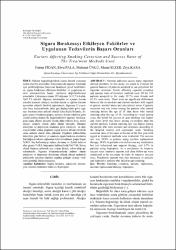Sigara bırakmayı etkileyen faktörler ve uygulanan tedavilerin başarı oranları
Abstract
Nikotin bağımlılığı klinik olarak önemli sorunlara
neden olan bir durumdur. Çalışmamızda sigarayı bırakmak
için polikliniğimize başvuran hastaların genel özelliklerini,
sigara bırakmayı etkileyen faktörleri ve uygulanan tedavi
yöntemlerinin başarı oranlarını değerlendirmeyi
amaçladık. Çalışmaya alınan 135 olgunun %32.7’si kadın,
%67.3’ü erkekti. Sigarayı bırakmışlar ve içmeye devam
edenler arasında cinsiyet, medeni durum ve eğitim durumu
açısından anlamlı farklılık saptanmadı. Sigaraya 15 yaşından
önce başlayanlarda, daha geç başlayanlara göre sigarayı
bırakma oranı anlamlı olarak daha düşük bulundu. Sigara
içmeyi bırakmış grupta, içmeye devam edenlere göre
vizüel anolog skalası ile değerlendirilen sigarayı bırakaca-
ğına inanç düzeyi anlamlı olarak daha yüksek iken, stress
düzeyi anlamlı olarak daha düşük bulundu. Hastane
anksiyete ve depresyon skalasına göre anksiyete ve depresyon
kabul edilen gruplarda sigara içmeye devam edenlerin
oranı anlamlı olarak daha yüksekti. Olguların kullandıkları
tedavilere göre birinci yıl sonunda sigara bırakma oranlarına
bakıldığında nikotin replasman tedavisi kullanan grupta başarı
%30.9, ilaç kullanmayıp sadece davranış ve destek tedavisi
alan grupta %18.8, bupropion kullananlarda %6.7 idi. Sonuç
olarak başarıyı arttırmak için yoğun destek, yakın takip gerekmektedir.
Sigarayı bırakamayanlarda anlamlı olarak
anksiyete ve depresyon skorlarının yüksek olması nedeniyle
psikiyatrik sorunları olanlara mutlaka psikiatri desteği verilmesi
gerektiği düşüncesindeyiz. Nicotine addiction causes many important
clinical problems. In this study, we aimed to evaluate the
general features of patients admitted to our polyclinic for
cigarette cessation, factors affecting cigarette cessation
and success rates of treatment methods used. Of the 135
patients accepted to the study 32.7% were female and
67.3% were male. There were no significant differences
between the ex-smokers and current smokers with regard
to gender, marital status and educational status. Cigarette
cessation rate was lower among the patients who started
smoking before the age of 15 than those who started
smoking after the age of 15. According to visual anolog
scale, the belief for success in quit smoking was higher
and stress level was lower among ex-smokers than the
current smokers. Current smoking rate was higher among
the people who were anxietic and depresive according to
the hospital anxiety and depression scale. Smoking
cessation rates of the cases at the end of the first year with
regard to treatment methods were evaluated. The success
rate was 30.9% in patients using nicotine replacement
therapy, 18.8% in patients who did not use any medication
but just behavioral and support therapy, and 6.7% in
patients using bupropion. As a conclusion, to improve
success rates intensive support and close follow-up were
considered to be necessary in order to improve success
rates. Pyschiatric support was also necessary in anxietic
and depressive patients who failed to quit smoking.
Source
Afyon Kocatepe Üniversitesi, Kocatepe Tıp DergisiVolume
6Issue
3Collections
- Makaleler [452]



















